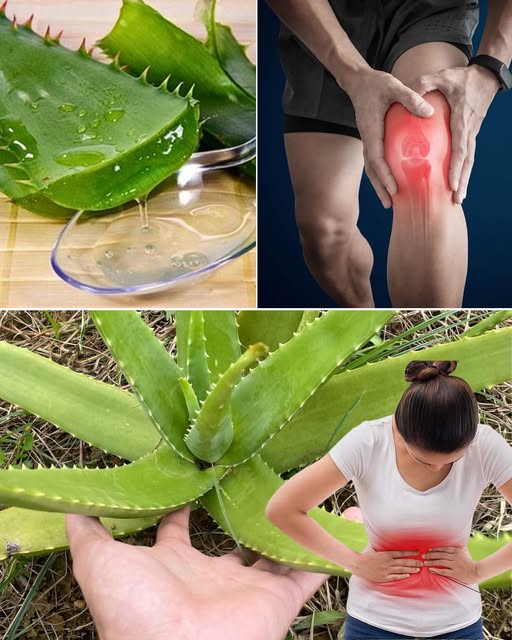Introduction:

Is your body trying to tell you something? If you’re constantly dealing with fatigue, skin issues, or digestive discomfort, you might be overlooking one of the most powerful, natural remedies sitting right on your windowsill — aloe vera.
This wonder plant has been treasured for over 6,000 years by ancient civilizations like the Egyptians and Greeks. But it’s more than just an age-old skincare staple — it’s a multi-purpose health powerhouse that could provide relief for a wide range of modern ailments. Whether you suffer from poor digestion, high blood sugar, acne, or frequent infections, aloe vera might be the natural solution you’ve been searching for.
In this blog post, we’ll explore 16 common health problems that aloe vera can help alleviate, answer frequently asked questions, and explain why this plant deserves a top spot in your wellness arsenal. If you’re ready to stop masking symptoms and start supporting your body from within, keep reading — you might just discover your new favorite natural remedy.
The Power of Aloe Vera: A Quick Overview
Aloe vera is a succulent plant packed with over 75 active compounds, including:
- Vitamins (A, C, E, B12)
- Enzymes (amylase, lipase)
- Minerals (calcium, magnesium, zinc)
- Saponins (natural cleansers)
- Anthraquinones (natural laxatives)
- Polysaccharides (immune boosters)
Its anti-inflammatory, antimicrobial, antioxidant, and healing properties make it one of the most versatile natural remedies available today.
16 Health Problems Aloe Vera Can Help You Solve
1. Acne and Skin Inflammation
Aloe vera gel is rich in salicylic acid and antibacterial compounds that reduce acne-causing bacteria and soothe inflamed skin. Studies show it can reduce acne lesions by 35% or more when used consistently.
How to use: Apply aloe vera gel directly to pimples or mix with tea tree oil for a natural overnight treatment.
2. Digestive Disorders
From bloating to irritable bowel syndrome (IBS), aloe vera juice may offer relief by soothing the intestinal lining and promoting healthy digestion.
Stats to know: A 2018 review found that aloe vera improved IBS symptoms in over 50% of participants.
How to use: Drink 1-2 tablespoons of pure aloe vera juice daily on an empty stomach.
3. Constipation
Aloe latex, a yellowish extract under the leaf skin, contains aloins, powerful natural laxatives.
Caution: Use sparingly (no more than twice a week) to avoid dependence or dehydration.
4. Type 2 Diabetes & Blood Sugar Spikes
Clinical trials suggest that consuming aloe vera may lower fasting blood glucose by 15-20%, helping manage type 2 diabetes symptoms naturally.
Key benefit: Aloe improves insulin sensitivity and reduces blood sugar spikes.
5. High Cholesterol
Aloe vera has been linked to reduced LDL (bad) cholesterol and increased HDL (good) cholesterol.
How to use: Combine aloe vera juice with a cholesterol-friendly diet to amplify results.
6. Frequent Colds and Weak Immunity
With high levels of antioxidants and polysaccharides, aloe vera stimulates white blood cell activity, helping the body fight off infections faster.
7. Burns and Wounds
It’s no surprise that hospitals still use aloe vera-based creams for treating first- and second-degree burns. Aloe speeds up healing time by up to 9 days compared to conventional treatments.
8. Psoriasis and Eczema
The cooling, anti-inflammatory effect of aloe vera can reduce itching, redness, and scaling.
Pro tip: Use aloe-based moisturizers daily to maintain hydration and relieve chronic flare-ups.
9. Hair Loss & Scalp Irritation
Thanks to its enzymes and minerals, aloe vera improves blood circulation to the scalp, balances oil, and strengthens hair follicles.
How to use: Massage fresh gel into your scalp twice a week and leave for 30 minutes before washing.
10. Ulcers and Acid Reflux
Aloe’s mucilaginous content helps coat the esophagus and stomach lining, soothing irritation and reducing acid production.
Research tip: A study published in the Journal of Traditional Chinese Medicine reported aloe vera reduced GERD symptoms in 79% of participants.
11. Oral Health Issues
Aloe vera mouthwash is proven to reduce plaque, bleeding gums, and mouth ulcers.
Why it works: Aloe kills bacteria like Streptococcus mutans and supports tissue healing.
12. Allergies and Sinus Congestion
Inhaling steam with aloe vera or consuming aloe can reduce mucus formation and ease breathing.
Key compound: Acemannan, known for anti-allergy effects.
13. Joint and Muscle Pain
Topical aloe reduces inflammation and stiffness in joints. Perfect for athletes or arthritis sufferers.
Bonus: Aloe’s magnesium and salicylic acid act like a natural pain reliever.
14. Detoxification and Liver Health
Aloe vera helps flush toxins, promote liver enzyme activity, and enhance bile production.
How to use: Combine aloe juice with lemon water in the morning for a liver-boosting detox.
15. Premature Aging
Loaded with vitamin C and E, aloe supports collagen production, reducing fine lines and wrinkles.
Study alert: One trial showed women who consumed aloe daily experienced increased collagen and reduced wrinkle depth in 90 days.
16. Weight Management
Aloe vera supports better metabolism, reduces water retention, and curbs appetite when used with a balanced diet.
Tip: Try aloe juice with apple cider vinegar and lemon before meals to enhance satiety.
Frequently Asked Questions (FAQs)
1. Is it safe to consume aloe vera daily?
Yes — in moderation. 1–2 tablespoons of aloe vera gel or juice from the inner leaf are generally safe for most adults. Avoid aloe latex, which can be harsh on the digestive system.
2. Can I apply store-bought aloe vera gel?
Absolutely, but read the ingredients. Opt for pure, organic, and alcohol-free versions with minimal additives.
3. How quickly can I see results?
Some issues like burns and acne may improve within days. Chronic conditions like diabetes or eczema may require 4–12 weeks of consistent use.
4. Can aloe vera interact with medications?
Yes. Aloe may interact with blood sugar-lowering drugs, diuretics, or laxatives. Always consult your healthcare provider before starting.
5. What’s the best way to store fresh aloe gel?
Refrigerate it in a clean glass jar. It stays fresh for up to one week.
Conclusion: Don’t Ignore What Aloe Vera Can Do for Your Health
In a world overwhelmed by synthetic supplements and quick fixes, aloe vera remains a timeless, powerful, and affordable natural remedy. It addresses 16 of the most common health problems today — not by masking symptoms, but by supporting your body’s natural healing systems.
From soothing skin flare-ups and boosting immunity to regulating blood sugar and improving digestion, aloe vera proves that sometimes, the best medicine really does grow in nature.
Ready to take charge of your health naturally? Start small: apply fresh aloe to your skin, sip it as a juice, or add it to your wellness routine — and feel the transformation for yourself.


